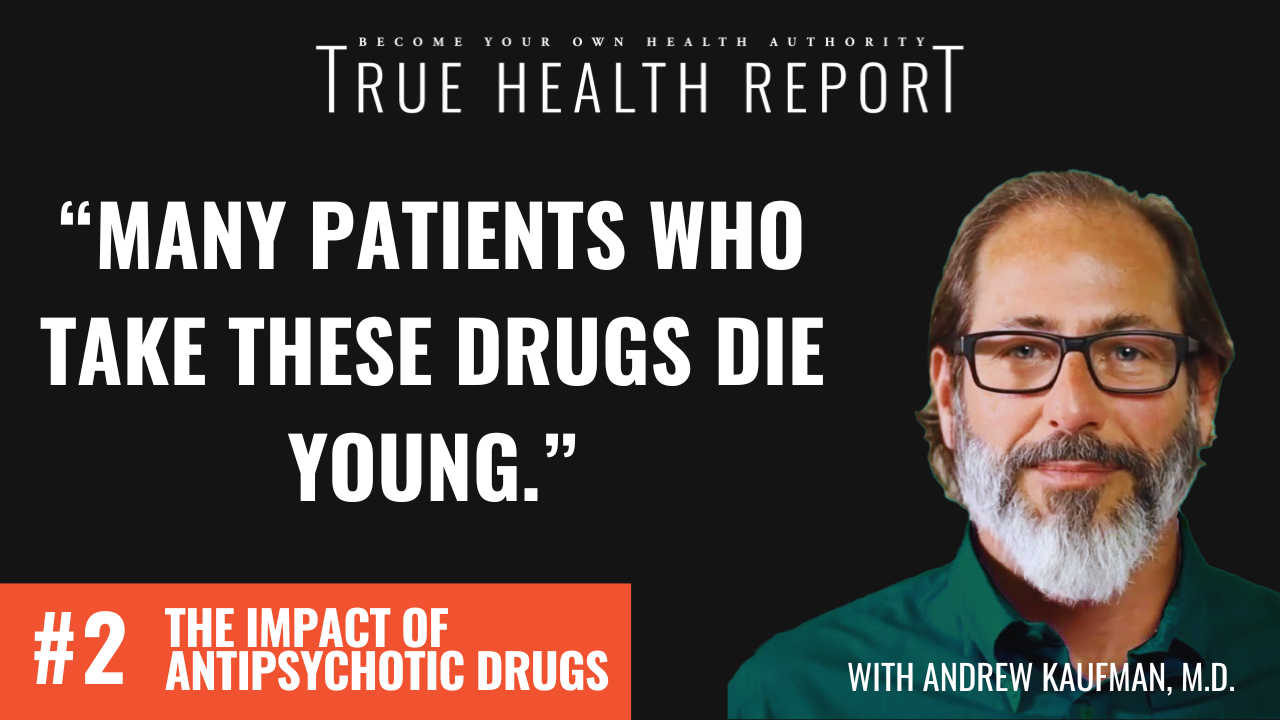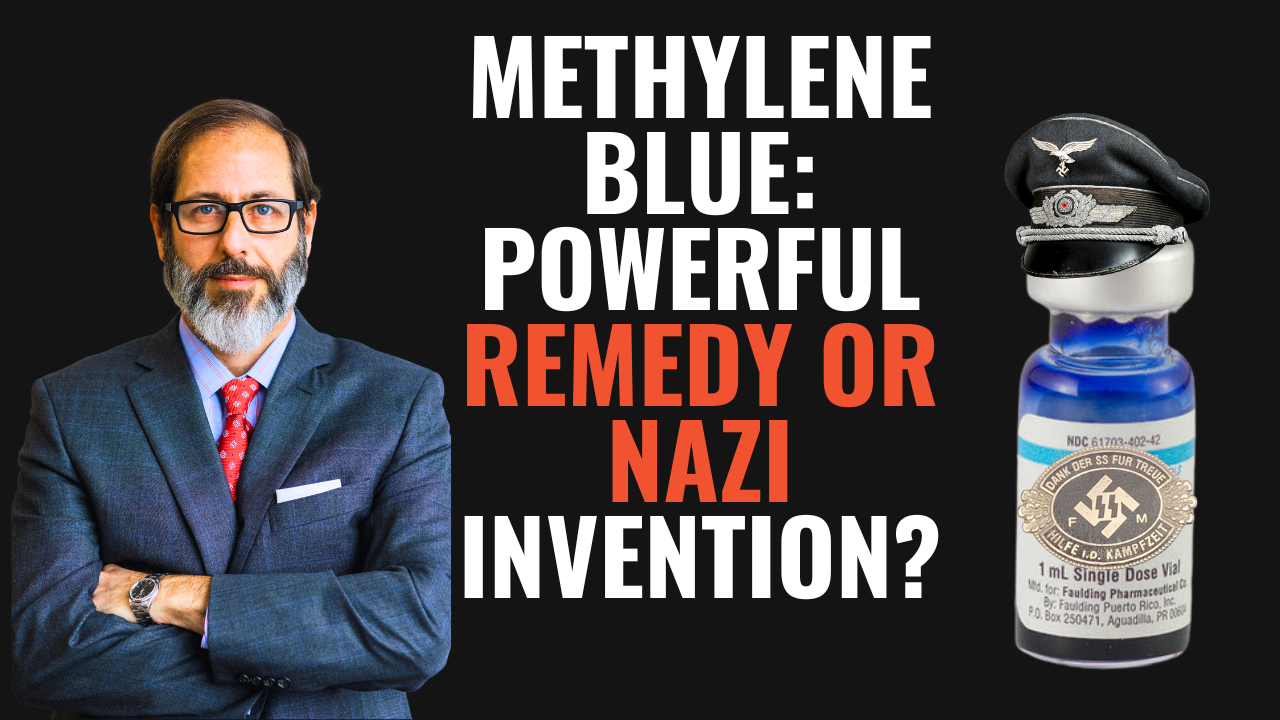A Critical Look at the Impact of Antipsychotic Medications
Mar 28, 2025
You can also watch the full episode on Rumble and Odysee and Bitchute!
In my experience in psychiatry, I was hired to prescribe these ineffective and harmful drugs.
“Antipsychotic medications are not really antipsychotic. They have limited—if any—benefit and are mostly just sedatives that carry very serious health consequences.”
Drawing from my own experience in psychiatry—both through my medical and psychiatric education—as well as in some of my clinical practice experience, I'm educating you about schizophrenia and antipsychotic medications. As opposed to focusing primarily on scientific papers, I’ll be referencing certain scientific studies to provide evidence to support my points.
The drugs themselves were once called “tranquillizers,” patients have been forcefully given these medications, and the general public hasn’t properly been informed of the impact of these drugs on individuals. Lastly, the alternative therapies for those with severe mental illness are often buried, crushing a patient’s ability to be their own well-informed health authority.
This, of course, is part of a larger topic on psychiatric medications in general, which is part of another larger topic on pharmaceuticals. There’s much for us to discuss over the course of this podcast. We’ll begin the journey back in my third year medical school rotations where I was in a psychiatric ward of a mental hospital…
Listen now on Apple Podcasts and Spotify too!
Topics covered in this podcast episode:
-
Dr. Andy’s clinical experience with schizophrenia and antipsychotic medications
-
The different classes and names of antipsychotic drugs
-
What scientific studies revealed (and kept hidden) about psychiatric medications
-
How the clinical outcome of antipsychotic medications were evaluated
-
Why patients would sometimes be forcibly given these drugs
-
Complications and side effects from antipsychotic medications
-
How antipsychotic drugs impact a person’s lifespan
-
The sequence of events that gets patients put on these drugs
-
Why Dr. Andy’s been critical of psychiatric medications
-
Case study of a teen who was having psychotic experiences
-
Treatment options for schizophrenia other than antipsychotic medications
-
Research done by medical professionals on these alternative treatment options
There are other very simple ways that—while we may not be able to explain exactly how they work, and they may be mysterious—can have meaningful results that can improve someone's actual life with almost no risk of any adverse effects.
I look forward to seeing you back for the next true health report.
Resources:
Anatomy of an Epidemic (book)
An Amazing Journey into the Psychotic Mind (book)
The unedited podcast transcript for this episode of the True Health Report follows
Hello, and welcome to The True Health Report. I'm your host, Dr. Andrew Kaufman. Today, I'm going to talk about schizophrenia and antipsychotic medications, and I'm going to do this a little bit differently than my usual approach. In other words, I'm not going to focus primarily on scientific papers. In fact, I'm not gonna have any slides, but I am gonna reference some scientific studies to provide evidence to support some of my points, but largely I'm going to draw upon my own experience in psychiatry, both through my medical and psychiatric education, and also in some of my clinical practice experience to help educate you about this very important issue.
And this is part of a larger topic really on psychiatric medications in general, which is part of a larger topic on pharmaceuticals. And as many of you know, my position is that I don't recommend the use of any pharmaceuticals really under any circumstances, although I know that there are some times it may be certainly more justifiable than others.
So let me start off in my journey back in medical school in my third-year rotations. And that was the first time I really experienced what it was like on a psychiatric ward in a mental hospital. And I was fortunate to be assigned to the inpatient service on the ward that had the people who are considered to have severe and persistent mental illness. And largely, the diagnosis you'll see among that population is schizophrenia and some other varieties of that.
But really they all fall under that general rubric of schizophrenia, or you could say psychosis. And this was a unique and interesting experience for me because the behavior of those people was so far outside your observation of normal behavior that it made me ask the question: How could someone who's like me in so many ways have thinking and behavior that is so different?
This was, of course, very fascinating with me because it showed, you know, the array of distinctions that one could see in an individual that are outside the norms and also gave me a reference point of how much of our behavior and thinking and understanding of the world is based on cultural constructs rather than what is actually our true nature in reality.
So this really helped inspire and foster my interest in pursuing psychiatry as a profession and which is where I ultimately ended up.
Now when I began my residency training is when I really started learning about antipsychotic drugs. And of course, I had some exposure to those before. Even in cancer medicine sometimes they're used for nausea or to treat someone with delirium, which is a complication either of an illness or sometimes of a drug effect.
Like I saw people that got high dose steroids, corticosteroids, things like prednisone and cortisol, who developed a drug-induced delirium. And then we ended up treating with antipsychotics and such.
But really it was in my residency that I started getting this exposure on a bigger scale to these drugs.
And let me say that these drugs actually, this class has different names. I think the most original name was tranquilizer because most of them have very strong sedating properties. And if you ever heard the term major tranquilizer, that's what it's referring to.
And the, you know, first drug of this kind was named Thorazine or chlorpromazine and actually was originally developed as an allergy medication, but then was used and marketed as a tranquilizer. And there were, you know, ads and magazines that essentially, you know, how to pacify your unruly, demented grandparents, you know, give them Thorazine.
And neuroleptics were another word that was applied to them later on. And you might hear that term. And antipsychotics came a bit later, and it implies that it has a specific action that works against psychosis, but this is really not the case.
It's really, these drugs are very non-specific, very sedating and don't really have that effect.
Now, in residency, aside from observing what happens to people taking these drugs, which I'll describe in a moment, we also looked at the clinical studies about these drugs.
And something really interesting occurred to me early on in reading these studies, which was that most of the studies used as their clinical outcome, in other words, how do you judge if this drug is good or not?
They didn't say, well, is this person's life different? Is it much better? Do they have better relationships? Are they more likely to be working or in school? These kinds of meaningful things. That's not what they looked at at all.
Instead, what they did is they used rating scales. And some of these rating scales are administered by the doctor or a psychologist, perhaps a professional that would, you know, try to make a somewhat objective assessment and rate the level of symptoms or functional ability on a scale that was standardized with a numerical value.
And some of them were self-reported scales where you'd simply like give a questionnaire to a patient or a study subject and they would fill it out, you know, and give an idea of how well they thought they were doing.
Now most of the studies used instruments or scales that were professionally judged and recorded and that was thought to be more objective. But what I noticed is that the difference between the groups that got treated with the drugs and the group that got a placebo or an older therapy was that it was a tiny, tiny difference.
Like not enough of a difference to be actually meaningful in life, even though it might have been enough difference to generate a statistical signal.
What I didn't realize at the time was that in addition to those published studies showing there was this very small but mathematically distinguishable difference, there were also unpublished studies at the same time that didn't show that effect.
But these had to be submitted to the FDA and maybe later could be analyzed through Freedom of Information Act. But if I would have known about that, then I would really just say, well, this little small effect that you showed in this study, it is just by chance because there's probably another study that didn't show it at all.
And it's so small that it doesn't make a difference in the person's life.
So when I asked the, you know, professor or the doctor who was teaching this course and giving the study data about that, he was a little bit ticked off and just dismissed me, you know, saying, well, no, it's a meaningful difference. And, you know, period, end of story.
But I was really beginning to question, do these drugs really work?
And then there was another study and this was a pretty famous study and it had a very different design. The design was basically that the patients would be given a drug. But then if they wanted to switch, either because it wasn't helping them or because they didn't like the side effects, then they would just be allowed to switch, and then they would be given a different drug. And this study was meant to compare these particular drugs, you know, which ones are more effective and have fewer side effects.
But the main thing that was found was that people kept switching because none of these things were working and they had bad side effects, and some had worse side effects than others. And this was completely supported by my clinical observation because I realized that it took a lot of convincing to get people to try these drugs. And then once they did, it took even more convincing to get them to keep taking them for the most part.
There were some people who liked the sedating properties of those drugs, but those people generally weren't really people with schizophrenia. The people with schizophrenia really did not want to take it. And this is why many of them were under court orders or they got put in the hospital under commitment and then got forced by legal proceedings, sometimes held down and injected or put in physical restraints and injected to be given these medicines because they didn't want to take them at all.
Now, you know, you could say, well, these folks were just resistant to everything. But if you offered them cocaine, they would not have refused, even if it was in a needle. So it's not a matter of them being afraid of all drugs. And also, it wasn't just that they wanted to get high. It’s just that they would accept a drug like that because it made them feel okay, at least temporarily. But when they took antipsychotic drugs, it did not make them feel okay.
In fact, there has been at least one study where they used experimental lab animals like rats. And there have been studies where the rats, especially if they're outside of a social situation, that they will use cocaine and even choose it over water and food. But when they're given antipsychotic-type drugs, they would choose not to take those things. They'd rather starve to death than take those. And that's because they make you feel bad.
They're almost like the opposite, and some more than others are like this, but of drugs that people take to experience euphoria. They can cause a dysphoria, and people don't want to take them.
And I observed that they made people gain weight. They were sedated. They caused different movement disorders. Some of them resembled Parkinson's disease. In fact, I saw some people so severely affected that they couldn't really even move. It can cause muscle stiffness, and that could even be like an emergency situation in some cases.
They cause this terribly insidious movement problem called akathisia, and this is very difficult to detect. The patients aren't educated about it. Most of the psychiatrists don't really know how to properly recognize it. It’s the kind of thing where you can just never get comfortable.
It's kind of similar to what people describe as restless leg syndrome, where they're just moving around incessantly and just can't get comfortable. But imagine if that was all the time, not just when you're trying to fall asleep, but every moment of the day—it can be very torturous.
And then I began looking into the literature more and saw that actually these drugs contribute to mortality and shorten lifespans.
For example, there was a study in Tennessee looking at all of the adolescent Medicaid recipients who were prescribed these types of drugs. And a lot of this was driven by a famous Harvard psychologist or psychiatrist, Joseph Biederman, who basically said that kids with bad behavior actually may have early onset or juvenile bipolar disorder. This is something he totally made up, but it justified giving those kids very strong antipsychotic medications.
So lots of teenagers in Tennessee and every other state were prescribed these drugs. And they looked at the outcomes and found that there was a small but substantial number of those teenagers who just had sudden death from taking these.
And I've actually seen one case of this in my own clinical experience. It was a patient that wasn't at the facility I was at but was transferred to the hospital from the facility that I was at and given the drugs there and had sudden death.
And then when we look at studies from adults who are taking these longer-term, like adults with schizophrenia, because they would tell you that you have to take these drugs for the rest of your life, that schizophrenia never can be resolved or reversed.
But what happened is that they had terrible metabolic disease because of the weight gain and alteration of their metabolism. They generally developed things like diabetes, heart disease, peripheral vascular disease, and died very, very young, like in their fifties, many of them.
So these drugs actually shorten the lifespan, and many times, as I mentioned before, they're given by force under a court order or with putting someone in restraints.
Now, at this point in my early career, when I had read all this research and started being less and less comfortable prescribing these medications, I came across a book called Anatomy of an Epidemic by author Robert Whitaker.
And it wasn't his first book about psychiatry that was critical of it. And in this book, though, which I definitely recommend, it kind of discusses the sequence of events of how patients get put on these drugs.
Sometimes it's through a chain of causation that they have a small problem at first, and then the treatment for that problem creates other problems, and the ball rolls downhill until you end up on antipsychotic drugs.
And he highlights through a series of case studies how this has really, you know, destroyed some people's lives and their whole mental experience.
And of course, I've been very critical of psychiatric medications because the idea of just giving a medicine to someone with serious mental issues ignores all of the important dynamics that went about to cause those illnesses, whether they be purely psychological or physical.
So it ignores the trauma, the toxic relationships, the learning disabilities—all of those aspects. And there's no systematic way that those things really get addressed at all.
So I think what we can take away from this is another similar lesson to many of the conclusions I've come to by studying allopathic medicine: antipsychotic medications are not really antipsychotic. They have limited, if any, benefit.
Mostly, really, they're just sedatives and tranquilizers, and they have very serious health consequences, up to and including sudden death.
And there are other ways, very simple ways, that while we may not be able to explain exactly how they work and they may be mysterious, they can have meaningful results that can improve someone's actual life with almost no risk of any adverse effects.
All right, well, I think that you definitely had the opportunity to learn something here about the world of psychiatric medications and mental illness. And I look forward to seeing you back for another True Health Report next time.
Stay connected with news and updates!
Join our mailing list to receive the latest news and updates from Dr. Andrew Kaufman.



